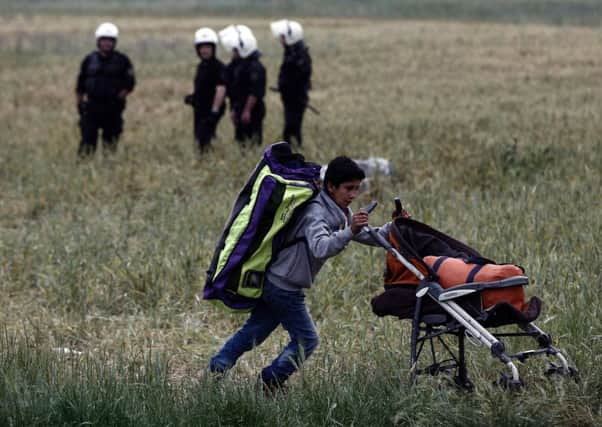Greek police help evacuate more than 1,000 refugees from camp


The government has pledged police will not use force, and says the operation is expected to last up to ten days. Journalists were blocked from covering inside the camp.
Dozens of buses carrying more than 1,100 people left Idomeni, heading to new refugee camps in northern Greece, police said, while earth-moving machinery was used to clear abandoned tents.
Advertisement
Hide AdAdvertisement
Hide AdVicky Markolefa, a representative of the Doctors Without Borders charity, said the operation was proceeding “very smoothly” and without incident. “We hope it will continue like that,” she said.
The camp, which sprang up at an informal pedestrian border crossing for refugees and migrants heading north to wealthier European nations, was home to an estimated 8,400 people - including hundreds of children - mostly from Syria, Afghanistan and Iraq.
At its peak, when Macedonia shut its border in March, the camp housed more than 14,000, but numbers have declined as people began accepting authorities’ offers of alternative places to stay.
In Geneva, UNHCR spokesman Adrian Edwards said the evacuation appeared to be taking place “calmly,” and the UN refugee agency was sending more of its workers to Idomeni.
“As long as the movement of people from Idomeni is voluntary in nature and we’re not seeing use of force, then we don’t have particular concerns about that,” he said.
In Idomeni, most have been living in small camping tents pitched in fields and along railroad tracks, while aid agencies have set up large marquee-style tents to help house people. Greek authorities have sent in cleaning crews regularly and have provided portable toilets, but conditions have been precarious at best, with heavy rain creating muddy ponds.
Recently the camp had begun taking on an image of semi-permanence, with refugees setting up small makeshift shops selling everything from cooking utensils to falafel and bread. More than 54,000 refugees and migrants have been trapped in financially struggling Greece since countries further north shut their land borders to a massive flow of people escaping war and poverty at home. Nearly a million people have passed through Greece, the vast majority arriving on islands from the nearby Turkish coast.
In March, the European Union reached an agreement with Turkey meant to stem the flow and reduce the number of people undertaking the perilous sea crossing to Greece, where many have died when their overcrowded, unseaworthy boats sank. Under the deal, anyone arriving clandestinely on Greek islands from the Turkish coast after March 18 faces deportation to Turkey unless they successfully apply for asylum in Greece.
Advertisement
Hide AdAdvertisement
Hide AdBut few want to request asylum in the country, which has been struggling with a deep, six-year financial crisis that has left unemployment hovering at around 24 percent.
Journalists were barred from the camp during the evacuation operation. An estimated 700 police were participating in the operation.
Greek authorities are also eager to reopen a railway line – the country’s main freight train line to the Balkans - that runs through the camp and has been blocked by protesting camp residents since March 20.
Anastassios Saxpelidis, a spokesman for Greek transport companies, said the 66-day closure has cost transporters about €6 million.
Giorgos Kyritsis, a government spokesman on immigration, said the line should open “in coming days”.